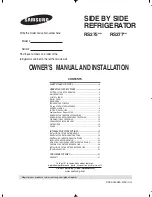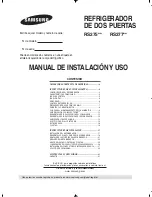
18
The refrigerator is
noisy
Refrigerator noise has been reduced over the years. Due to this reduction in operating noise, you may notice
unfamiliar noises that are normal. Following are some normal sounds with an explanation:
■
Buzzing - heard when the water valve opens to fill the ice maker
■
Clicking/Snapping - valves opening or closing
■
Pulsating - fans/compressor adjusting to optimize performance
■
Rattling - flow of refrigerant, water line, or from items placed on top of the refrigerator
■
Sizzling/Gurgling - water dripping on the heater during defrost cycle
■
Popping - contraction/expansion of inside walls, especially during initial cool-down
■
Water running - may be heard when ice melts during the defrost cycle and water runs into the drain pan
■
Creaking/Cracking - occurs as ice is being ejected from the ice maker mold
The door will not
close completely
■
The door is blocked open - Move food packages away from door. Push bin or shelf back into the correct
position. Make sure the crisper cover is fully pushed in, so that the back rests on the supports.
The door is
difficult to open
■
Gaskets are dirty or sticky - Clean gaskets and contact surfaces with mild soap and warm water. Rinse and
dry with soft cloth.
Temperature is
too warm
■
New installation - Allow 24 hours following installation for the refrigerator to cool completely.
■
Door(s) opened often or not closed completely - Allows warm air to enter refrigerator. Minimize door
openings and keep doors fully closed.
■
A large amount of warm food has been recently added - Allow several hours for refrigerator to return to
normal temperature.
■
Check that the Temperature Control(s) are set correctly for the surrounding conditions - Adjust the
controls to one setting colder. Check temperature in 24 hours. See “Using the Control(s).”
There is interior
moisture buildup
NOTE: Some
moisture buildup is
normal.
■
Humid room - Contributes to moisture buildup in the refrigerator.
■
Door(s) opened often or not closed completely - Allows humid air to enter the refrigerator. Minimize door
openings and keep door fully closed.
The ice maker is
not producing ice
or not enough ice
(on some models)
■
The ice maker is not connected to a water supply - Connect refrigerator to water supply and turn water
shutoff valve fully open.
■
A kink in the line can reduce water flow - Straighten the water source line.
■
Ice maker is not turned on - Make sure the ice maker wire shutoff arm or switch (depending on model) is in
the ON position.
■
New installation - Wait 24 hours after ice maker installation for ice production to begin. Wait 3 days for full
ice production.
■
Large amount of ice recently removed - Allow sufficient time for ice maker to produce more ice.
■
Ice cube jammed in the ice maker ejector arm - Remove ice from the ejector arm with a plastic utensil.
■
A reverse osmosis water filtration system connected to your cold water supply can decrease water
pressure - See “Water Supply Requirements.”
The ice cubes are
hollow or small
(on some models)
NOTE: This is an
indication of low
water pressure.
■
The water valve is not completely open - Turn the water shutoff valve fully open.
■
A kink in the line can reduce water flow - Straighten the water source line.
■
A reverse osmosis water filtration system connected to your cold water supply can decrease water
pressure - See “Water Supply Requirements.”
■
If questions regarding water pressure remain, call a licensed, qualified plumber.
Off-taste, odor or
gray color in the
ice (on some
models)
■
New plumbing connections can cause discolored or off-flavored ice - Discard the ice and wash the ice
storage bin. Allow 24 hours for the ice maker to make new ice, and discard the first 3 batches of ice
produced.
■
Ice stored too long can develop an off-taste - Discard ice. Wash ice bin. Allow 24 hours for ice maker to
make new ice.
■
Food odor transferring to ice - Use airtight, moisture proof packaging to store food.
■
There are minerals (such as sulfur) in the water - A water filter may need to be installed to remove the
minerals.
If you experience
Possible Causes and/or Recommended Solutions
Summary of Contents for WRT511SZDB
Page 64: ......
















































